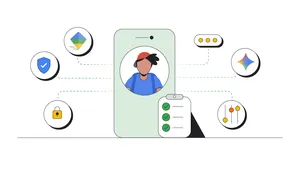How this African startup is using AI to close data gaps in healthcare

Ayodeji Alaran, the founder and CEO of PBR Life Sciences, began his career as a trained pharmacist, working with global pharmaceutical giants like GlaxoSmithKline and Pfizer across Africa and Asia. During his time with these companies, he saw firsthand how a lack of reliable data led to massive losses.
One issue kept resurfacing — the pharma companies were left with large volumes of expired inventory due to a lack of data to properly forecast trends, especially regarding diseases and the quantity of medicines to be manufactured or imported into different countries.
This realization sparked the birth of PBR Life Sciences in 2016.
Despite the availability of healthcare data, it was difficult to clean up and analyze it to globally acceptable standards — so he began training and building AI models from scratch specifically for data standardization.
As Ayodeji joins the third cohort of the Google for Startups’ Growth Academy: AI for Health program, he shares his key moments, lessons, and leaps that have defined the journey so far — and what’s still to come.
Training and building AI models changed everything for us
Initially, we were looking for AI algorithms that had already been trained on healthcare data in Africa, but we couldn’t find any — so we had to build our own. At the time, cleaning a data set would take us eight to nine months, but with our proprietary AI models, it now takes us 20 minutes.
We now use AI for data standardization to meet WHO requirements because most of what we collect is real-world data. However, even with all this technology and AI models, domain knowledge is still very important. In our backend team, we have doctors, pharmacists, and knowledgeable scientists who have practical knowledge of diseases and drugs so that our work is accurate and relevant.
AI powered our backend; we are now shifting it to the frontline
So far, most of our AI deployment has been in the back office — focusing more on operational excellence. But now that we’re part of the Google for Startups program, we’re shifting our focus towards unlocking more value for our customers and patients.
For example, could we deploy our proprietary data together with Google's AI to visualize where diseases are prevalent, identify areas with supply laxity, or intervene in areas where prices are poorly managed?
Integrating with solutions as simple as Google Maps could help healthcare workers and pharmaceutical companies map opportunities in a practical way.
We are scaling in emerging markets, thanks to AI
The challenges we are solving are not limited to one country — they’re shared across emerging markets. What’s more, as global pharma companies shift from typical clinical trials to using big data and AI for drug discovery, we’ve realized that this data excludes patients from emerging markets — which means future medications may be built without these populations in mind.
To change this, we’re scaling to build more data sets. For instance, we’ve recently expanded to Ghana and Kenya. Our goal is to be in 20 countries in the next 10 years to help us better advocate and ensure that these markets are factored in during drug discovery, drug pricing, and introduction of new technologies.
This June, we’re also launching three new AI-powered products, including the Health Data Lab, which will be the largest anonymized dataset of Black patients in the world to boost clinical research.
Learn more about PBR Life Sciences here.






